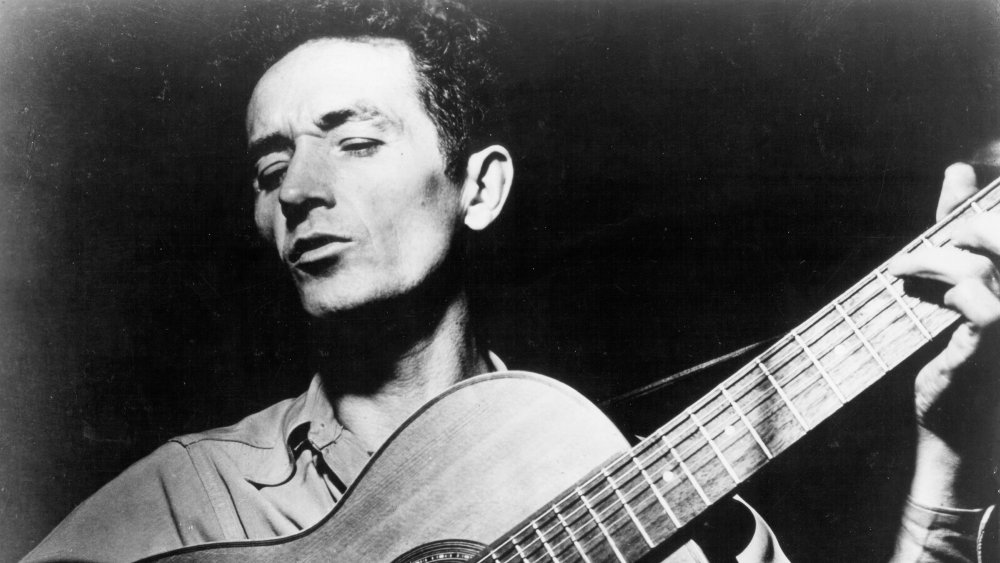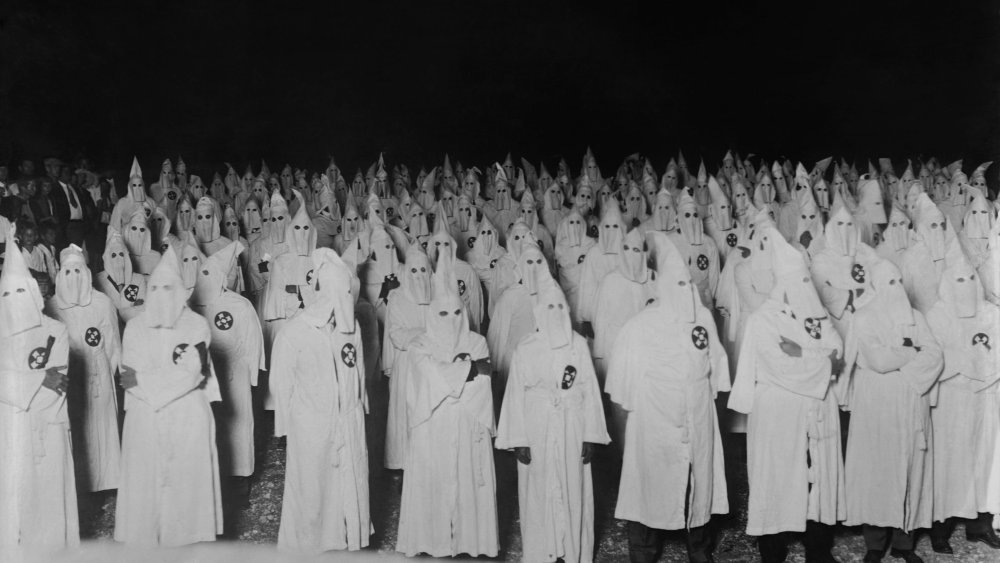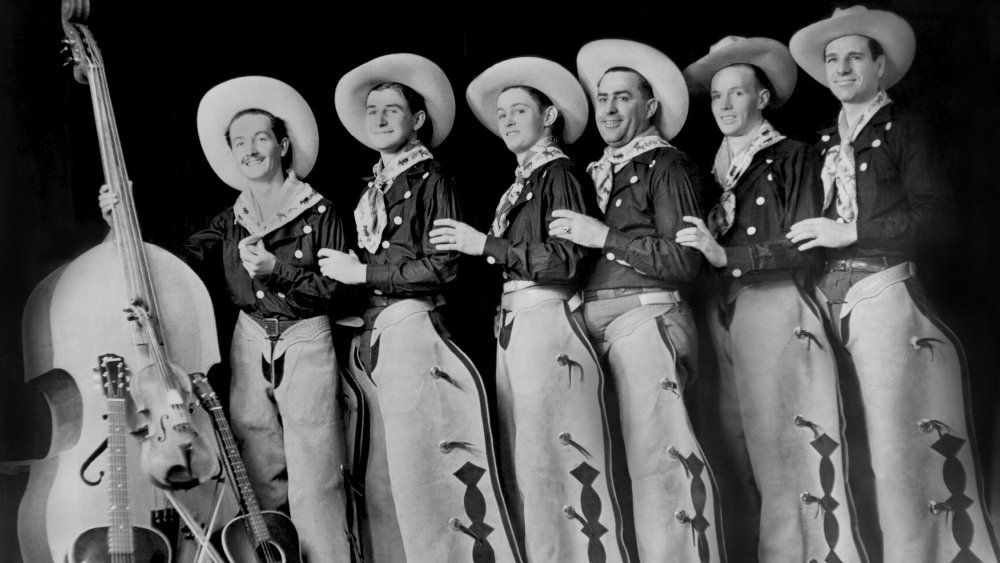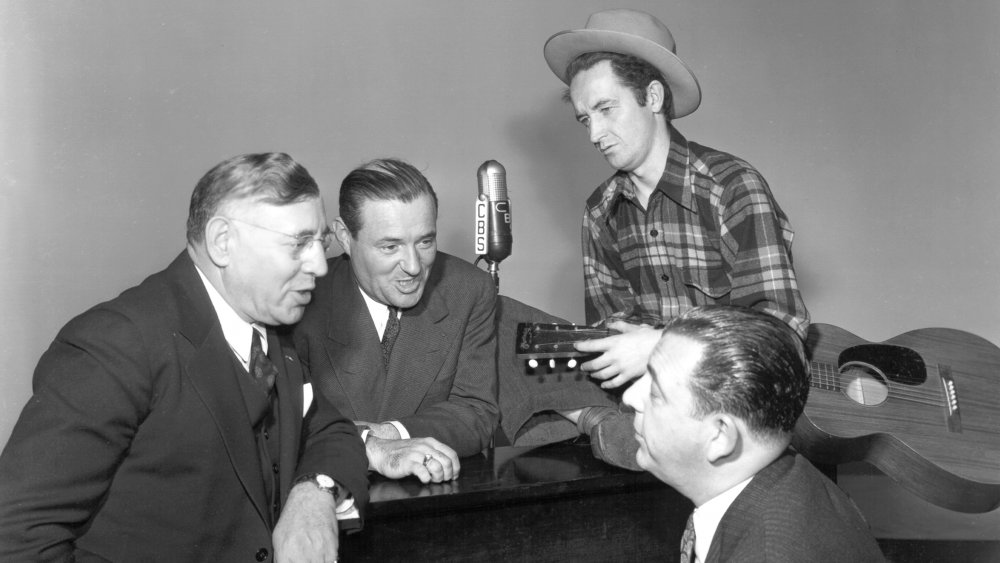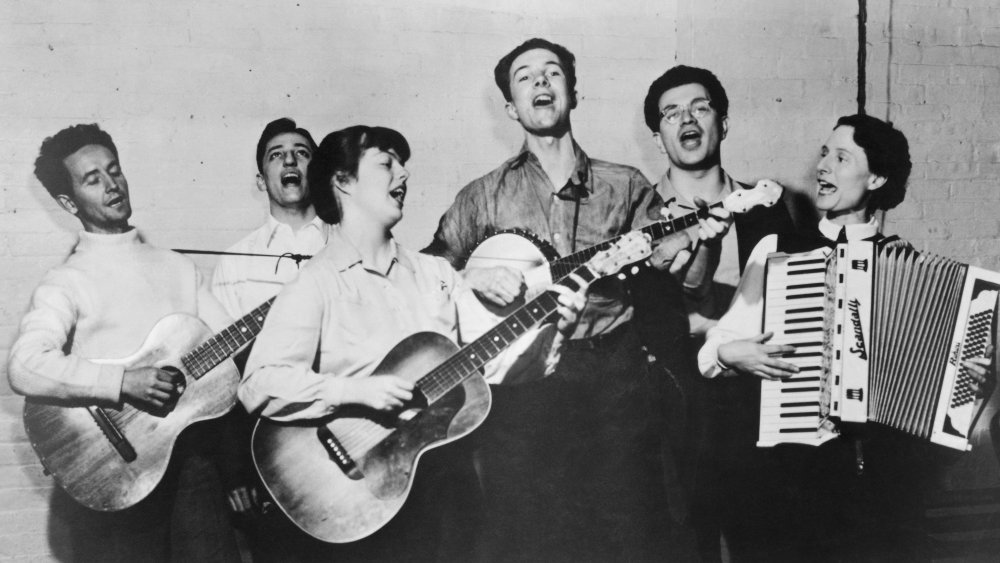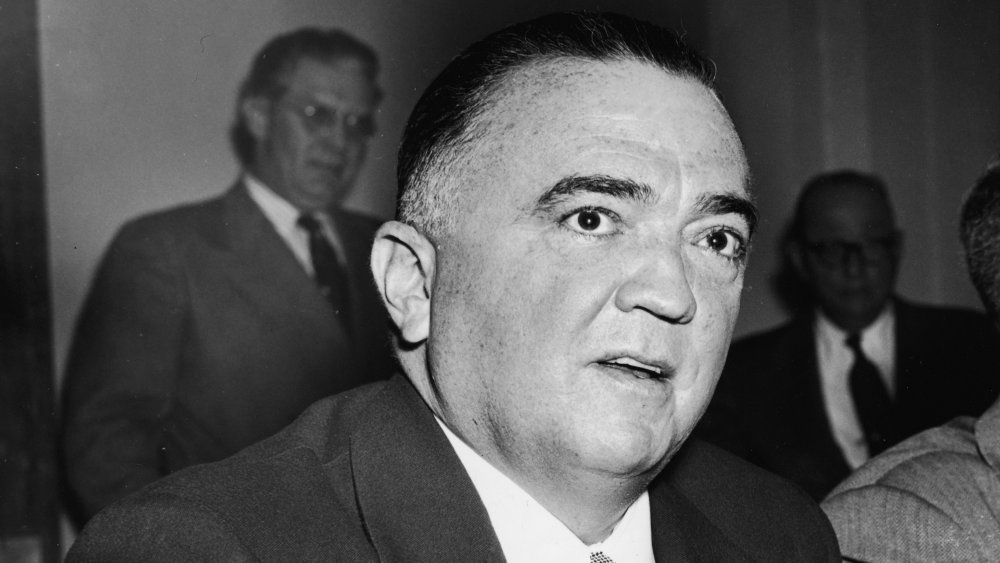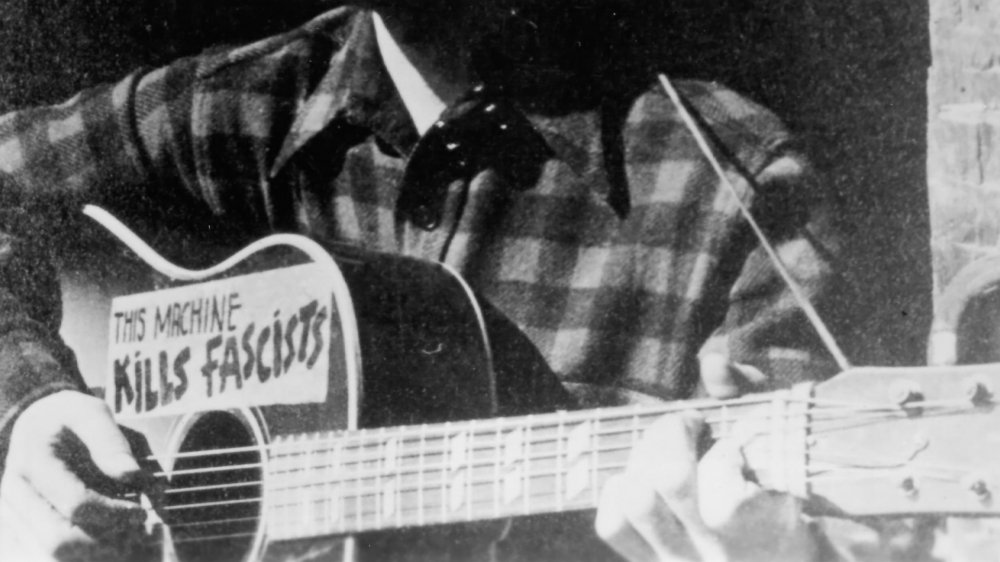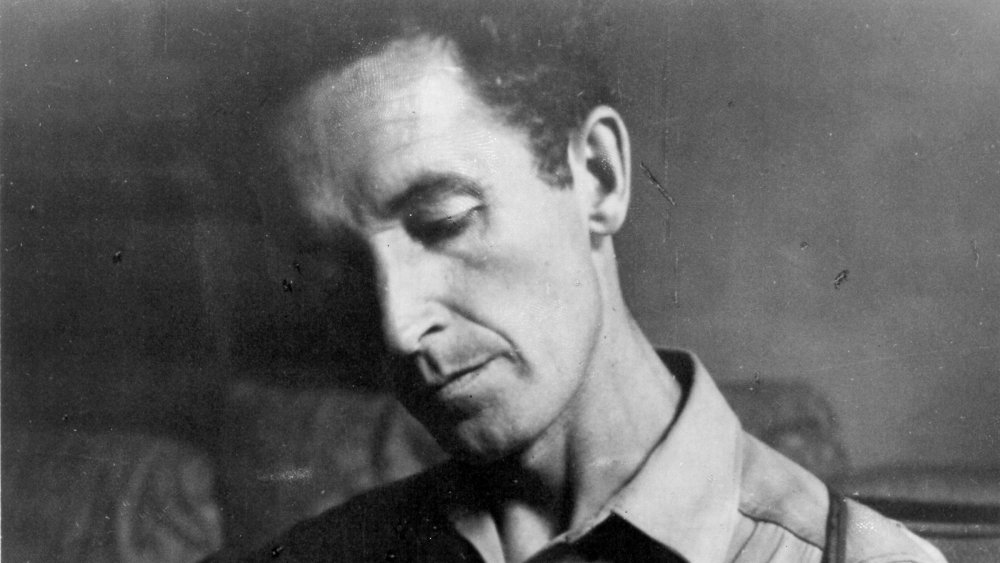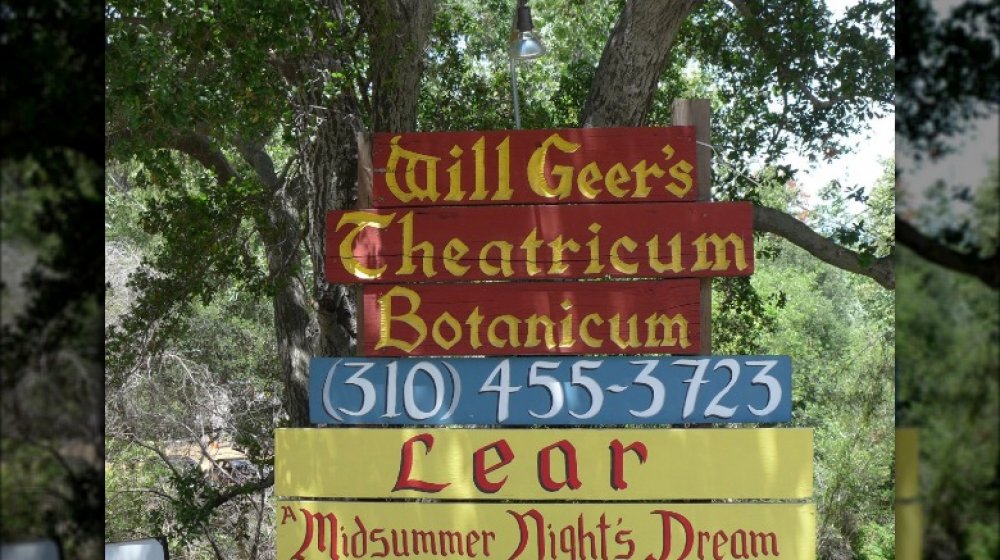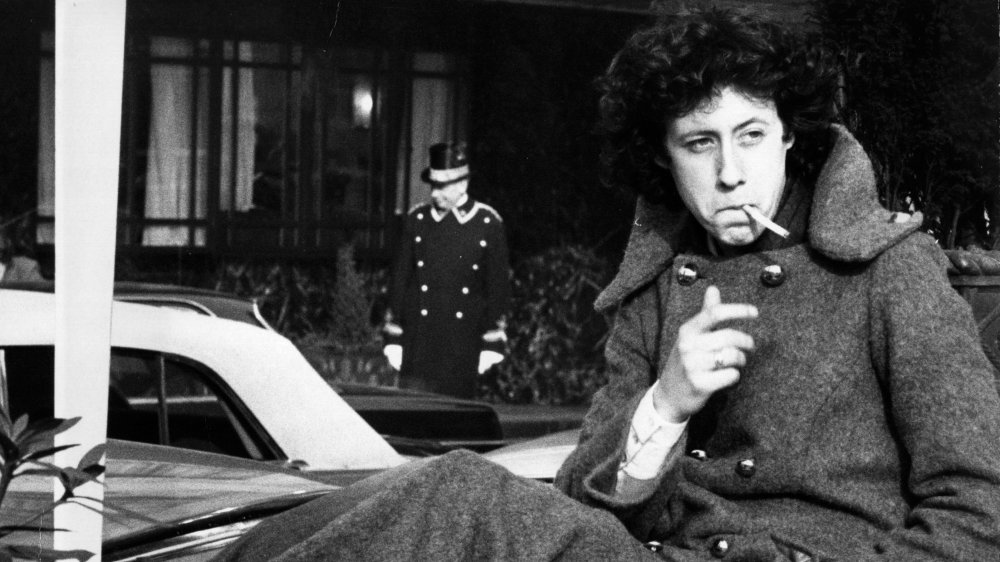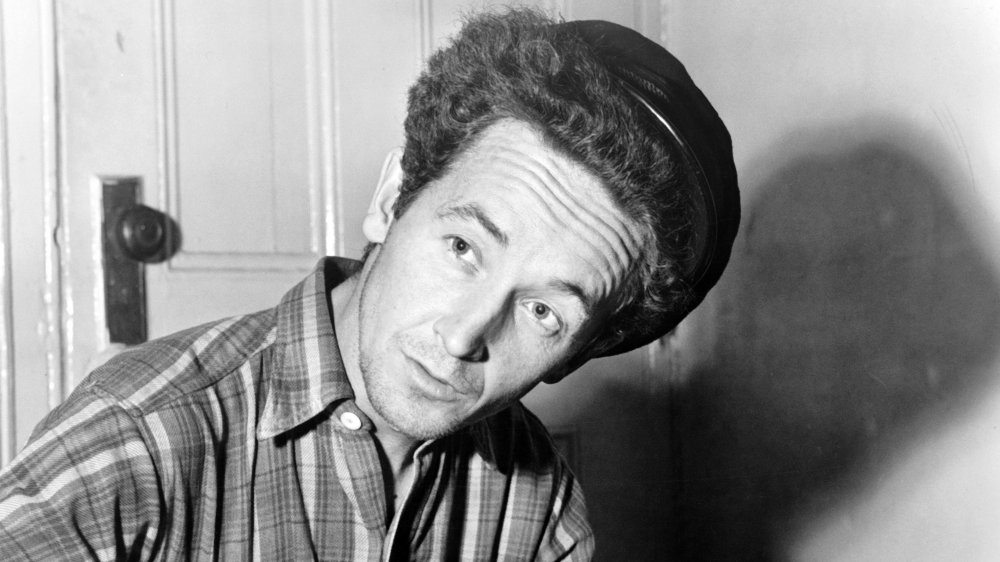The Tragic Real-Life Story Of Woody Guthrie
Woody Guthrie was a giant of Western American folk music, looming large in the American imagination for everyone from schoolchildren learning his songs to musicians radicalized by the message of his music. It's probably not a surprise to hear that someone who wrote so passionately about equality, working people, and uniting for change experienced a number of difficulties in life to make him such a champion for the common people across the country. While he gave joy and solidarity to others through his music, his somewhat brief life was filled with challenges.
It's further testament to Woody Guthrie's importance that, while surviving a number of obstacles that could completely upend the life of most people, he still managed to produce the staggering amount of treasured work that he did. From living through the Dust Bowl, struggles to find work during the McCarthy era, and difficulty with family diseases and alcoholism, the legendary singer-songwriter's life was marked as much by tragedy as triumph. Here's the sad story of Woody Guthrie.
Woody Guthrie's father was a member of the Ku Klux Klan
Named after the soon-to-be president of the United States, Woodrow Wilson Guthrie was born July 14, 1912, in the small town of Okemah, Oklahoma. His father, Charles Guthrie, was a successful businessman, local politician, and KKK member — basically everything Woody would grow up to fight against. Although slavery was formally outlawed, Jim Crow laws, white supremacy and an epidemic of racist violence were spreading across the country, as Mark Allan Jackson notes in his book Prophet Singer: The Voice and Vision of Woody Guthrie. This was during a time where the KKK had nearly total control over the state of Oklahoma. The year before Woody's birth, Charley attended and possibly participated in the horrific lynching of Laura Nelson and her son, L.D. Nelson. Ten years later, the Tulsa Race Massacre was carried out by mobs of white men, roughly 60 miles from Guthrie's birthplace.
Though he came from money, family misfortunes would leave young Woody Guthrie struggling along with other poor, displaced, and Black Americans. According to The New Yorker, he quickly latched onto the egalitarian ideas of socialism. That his father embodied many of the things he'd come to stand against affected Woody, his work and ideology profoundly.
Multiple fires shaped Woody Guthrie's early life
Though it sounds like the kind of folksy exaggeration common to many of Woody Guthrie's songs, tragic fires violently affected his life from beginning to end. The Guthrie family home burned down when Woody was a toddler. His sister Clara, with whom the young Guthrie was especially close, died in a fire during a fight with their mother. Woody was only 6 years old at the time. According to Mark Allan Jackson, writing for the Library of Congress, Nora Guthrie had been displaying erratic and occasionally violent behavior before Clara's death. In 1927, when Guthrie was 14, his mother threw a kerosene lamp on his sleeping father. Charley was severely burned, and Nora was institutionalized following the attack. She was already suffering the debilitating effects of Huntington's, a disease which was not well understood at the time and which would rear its head again in Woody's life.
But the damage done by fires didn't stop there. According to PBS, Woody Guthrie's daughter Cathy was only 4 years old when a radio short-circuited, starting a fire that spread through Cathy's bedroom and killed her. This plunged Guthrie into a deep depression. Many years later, already suffering from Huntington's himself and living briefly in Florida, Guthrie was again hurt by fire. After splashing gasoline onto a campfire, he burned himself badly. Though he recovered, his arm didn't, and he would never play guitar again after that terrible accident.
He had to become self-sufficient early on
While Woody's early years were spent in relative comfort with his successful businessman father, things changed quickly for the Guthries. After World War I, bad real estate deals led to Charley losing his land, and the kerosene incident left him with a long recovery, according to the Library of Congress. With Nora institutionalized, Charley left for Pampa, Texas, with his two younger children, Mary Jo and George, leaving Woody and his older brother Roy to fend for themselves in Okemah.
The need to survive made 14-year-old Woody Guthrie extremely resourceful. In addition to playing music on the street for change, he picked through the trash to find scrap to sell and stayed with friends or traveled for whatever other work he could find. During his junior year of high school, although he was popular for his humor and music, Woody dropped out to join his father in Pampa. According to the Oklahoma Historical Society, this was where he learned to play the fiddle, banjo, guitar, and violin so he could play at dances for money. But he also worked for a bootlegger, painted signs, and did whatever else he needed to. Despite earning very little money for all his work, as PBS notes, Woody Guthrie was known for giving it away to anyone he thought needed it more than him. This was noble, but it would also cause problems when it came to keeping his young family fed in the coming years.
Woody Guthrie's career and politics were at odds
Woody Guthrie met his first wife, Mary Jennings, in Pampa, and they married in 1933 when he was just 19. By then the great drought that caused the Dust Bowl was already devastating the Plains, according to PBS. By '34, the once-fertile region had been turned into a desert wasteland, deepening the impact of the Great Depression. With a new family to provide for, Woody migrated to California during the Dust Bowl.
The New Yorker notes that novelty cowboy singers were wildly popular at the time. In 1937, Woody found work performing a comedic musical hillbilly act for radio on KFVD in Hollywood. Along with his broadcast partner Maxine "Lefty Lou" Crissman, he was able to ride the wave of kitschy cowboy nostalgia and make a name for himself in Los Angeles. The duo received thousands of fan-letters and a little money, according to the Oklahoma Historical Society. But as his audience grew, Ed Cray notes in his book Ramblin' Man: The Life and Times of Woody Guthrie, so did general awareness of his socialist views (he'd been writing for leftist publications for some time already). In his own words, the songs were "so left-wing I had to sing em with my left tonsil, an string my gittar up backwards to git any harmony." Amid fears that the radio station would appear sympathetic to the Soviet Union, he was fired. The more politically vocal he became, the more his following shrank, but Woody Guthrie only continued to develop and share his voice and ideas.
Woody Guthrie was drafted but preferred to fight with music
In New York, Woody Guthrie was supported by a like-minded community of radicals and musicians like Pete Seeger, Leadbelly, Burl Ives, and many others. His popularity climbed again, and in 1941 he formed an anti-war folk group called The Almanac Singers. By this time, Mary and the children were living back in California and the Guthries were all but divorced, but Woody stayed furiously busy. At first the Almanac Singers wrote songs critical of the war, as noted in Prophet Singer, but when Hitler invaded the Soviet Union in June 1941, their music became explicitly anti-fascist. This was the era where the famous phrase "this machine kills fascists" began appearing on Woody's guitar.
Before the divorce with Mary was finalized, Woody Guthrie was already starting a family with Marjorie Mazia. He joined up with the military-adjacent civilian naval group the Merchant Marine after being persuaded by a friend, did his time, and returned home, but soon received another draft notice. His pleas for deferment were denied, according to Ramblin' Man, and he was sent out again. But Guthrie's communist leanings became less and less tolerable to the United States government, so in retaliation for some of his writing in communist newspapers, the FBI suspended Guthrie's seaman's papers. He was then drafted into the Army just as World War II was coming to an end. But as it turned out, this would not be the end of his harassment by the government.
The FBI kept files on Woody Guthrie
Whatever the public thought about his politics, many in the government considered the prolific writer of folk songs, children's music, and ballads for the working class to be a potential threat to the United States. As early as 1941, the FBI was keeping files on Woody Guthrie. According to Ramblin' Man, these were filled with things like traffic citations, missed car payments, and even work he had done for the Department of the Interior as so-called evidence of Woody's activity with the Communist Party. This surveillance continued even as his health was declining due to Huntington's disease. In 1953, the FBI interviewed his physicians, demanding doctors break patient confidentiality so the government could monitor his health status and classify him as a security risk, according to PBS. Guthrie was publicly declared a communist by the House Un-American Activities Committee (HUAC) in 1948, smeared and blacklisted.
The tragic irony is that, while he certainly shared the same views, following the party line according to The New Yorker, Woody Guthrie was never actually a registered member of the Communist party. And while the label hasn't stopped Guthrie from staying on in the popular imagination, it's hard not to wonder what his legacy could have been if he hadn't been hounded by a paranoid government for so long.
He lost work after being publicly named a Communist
As the Red Scare reached a boiling point, Hollywood stopped making movies that could potentially be seen as controversial or socially relevant during McCarthyism. Woody Guthrie lost film projects he'd had lined up, and his loosely autobiographical book Bound for Glory was shelved. The same sad phenomenon occurred within the music industry; RCA Victor discontinued his Dust Bowl Ballads in a major blow. Soon, the singer who wrote song after song praising the power of unions couldn't even find work for them. In the wake of the anti-communist frenzy, union members were forced to sign anti-communist oaths as a condition of membership, so they were scared of retribution.
In some ways, this experience made Woody Guthrie into a martyr, according to Ramblin' Man. While newspaper headlines continued to echo the paranoid and dangerous accusations by HUAC, Guthrie wrote, "These Un-American Committee boys are causing more folks to love us communists than to hate us." However false this bravado might have been, there is no denying that the Guthries were struggling financially after Woody was given the McCarthy treatment, and this worsened tensions with his wife Marjorie. Guthrie's friend, actor, and fellow blacklisted leftist Will Geer bought property in Topanga Canyon where he lived off the land with his family and built a theater that became a refuge for other starved artists. As noted in the LA Times, Woody moved into a shack on the property following a split with Marjorie. But bigger problems were already descending on the folk hero.
Woody Guthrie's declining health and marriage
After the HUAC hearings, Woody Guthrie's struggle to find work left Marjorie working almost nonstop to support the family, according to Ramblin' Man. By the late 1940s, Guthrie was already suffering the effects of the same disease that had violently taken his mother. According to PBS, Huntington's disease destroys brain cells, leading to mood disorders, psychotic breaks, dementia, and death, usually within 15 to 20 years of the diagnosis. As Guthrie began to show the erratic, unpredictable and occasionally violent behavior caused by Huntington's, Marjorie became afraid for their children.
After repeated violent outbursts and brief hospital stays, doctors suggested to Marjorie that Woody go to California for the safety of the children, and with few options available to him, he did. Shortly after he went to Topanga Canyon, the Guthries divorced. In a letter he wrote to his family, Woody Guthrie addressed Marjorie, pained and regretful for the damage done to the family. "In and through all of my walkouts and disappearances, I loved you. ... I hated myself because I felt like I'd failed you. I felt like I failed you politically, socially, musically, husbandly, fatherly, manfully, and in every other way a man can or could ever fail a woman."
Alcoholism made everything worse
Huntington's disease was rare and little understood back then, according to PBS, so it was difficult to diagnose. Many of the troubling behaviors exhibited by Guthrie seemed as likely to be caused by alcoholism as anything else, and his chronic drinking problem was well-known. According to Ramblin' Man, repeated hospital visits and attempts at sobriety couldn't save Woody Guthrie's health or his marriage. Guthrie freely admitted to doctors that alcohol was probably a crutch for his depression and irritability.
Marjorie kept trying to get a diagnosis from doctors other than simple alcoholism, knowing something else was wrong. One doctor even said Woody's symptoms could indicate schizophrenia or Huntington's, but the diagnosis wasn't made until later. Although nobody could pinpoint when exactly the disease began to rear its head in Woody Guthrie, one thing was certain: Alcohol abuse exaggerated and worsened the effects of the disease. Incredibly, Woody still found humor in it, joking to Pete Seeger that the dizziness he felt from his symptoms was just like being drunk, but cheaper.
Woody Guthrie's third marriage was brief and rocky
While living on the Geer property in Topanga Canyon, Woody's health continued to worsen. But as prolific and expressive as he was, he kept playing music and performing whenever he could. It was in this cloistered, artistic community that he met Anneke Van Kirk, a married hippie who lived nearby. Though she was half his age, the two began an affair and eventually married in 1953.
Woody's ongoing struggles meant he couldn't provide financial security, and the couple had to rely on friends in the area for many of their needs. This only exacerbated tensions in the community that had started with Anneke and Woody's affair. Many of their friends didn't approve of the situation, according to Ramblin' Man, feeling Woody was just "a bum with talent" who wouldn't be able to offer much to Anneke, and resenting that he'd run off with the wife of someone who was generally well-regarded there. On top of that, Anneke was exhausting herself trying to take care of Woody as his health continued its steep decline. They moved around from state to state for a bit, but divorced in 1956. They'd had one child together, named Lorinna, whom Anneke gave up for adoption.
His relationships with his children were complicated
Woody Guthrie had complicated relationships with all of his children, according to PBS. His first three with Mary — Gwendolyn, Sue, and Bill — were loved but also largely neglected by their father, and were left to be raised by Mary while Guthrie continued to pursue his career, his ideals, and other women. On the other hand, he was extremely devoted to Cathy, Arlo, Nora, and Joady, the four children he had with Marjorie. Arlo (pictured) went on to become a celebrated artist during the 1960s folk revival. Lorinna, born on the cusp of Guthrie's long period of hospitalization and slow death, was all but forgotten.
The mythic tragedy that seemed to dog Woody Guthrie throughout his life was carried down to some of his offspring, too. His son Bill died in an auto accident at the age of 23. His daughters Gwendolyn and Sue both died at age 41 from Huntington's disease. His daughter Cathy, whom he was closest to and nicknamed "Stackabones," had died at age 4, sending him into a deep depression which Marjorie later believed had been the trigger for his Huntington's symptoms.
Woody Guthrie suffered in his final years
Woody was only 42 when he entered the hospital for the last time in 1954, according to Ramblin' Man. He would remain hospitalized, with some brief breaks and transfers between hospitals, until his death in 1967. The slow process of death brought on by Huntington's would be truly miserable for anyone: As it advances, the disease causes people to lose mobility, memory, and even the ability to speak and move, according to PBS. For Guthrie, the extremely prolific writer and singer who devoted his life to communicating with others through music and activism, this was a fate worse than death.
He and Marjorie had stayed in contact, having never truly fallen out of love, so as his condition worsened, she came back into his life to care for him until he died, as noted by PBS. Even with the diagnosis, the disease wasn't very well understood, and Woody Guthrie went essentially untreated. Eventually he could only communicate by moving his eyes. He died at the age of 55 on October 3, 1967. That same year, Marjorie started a foundation for research, and lobbied Congress for funding to better understand the disease that had destroyed her husband and devastated his family. Thanks to his high profile and Marjorie's tireless work, better understanding of this terrible disease was eventually reached. Just a few months after Marjorie's death in 1983, scientists finally discovered the gene that causes Huntington's.
